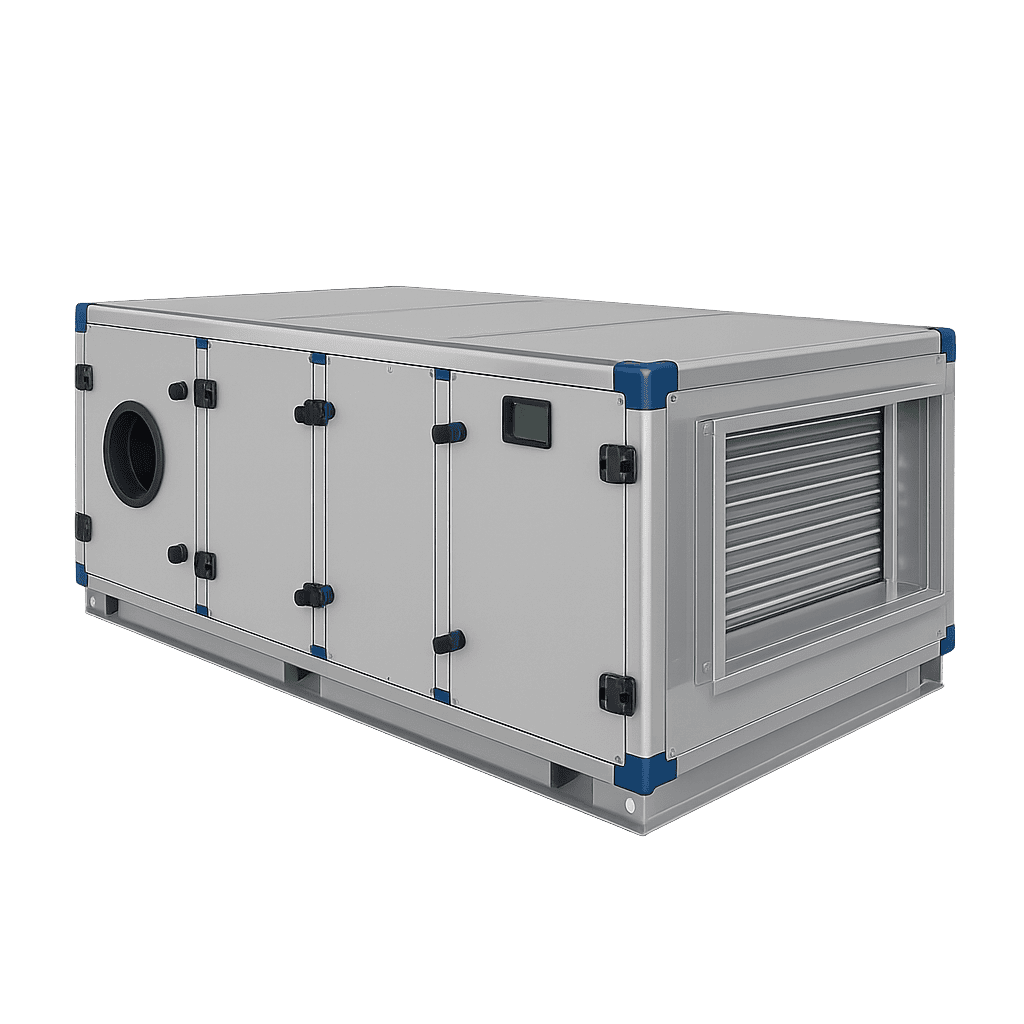Engineering Next-Generation HVAC Solutions for UAE’s Climate
We deliver smarter AHU, FAHU, and Chiller systems that optimize energy, improve air quality, and seamlessly integrate with BMS/SCADA. Our solutions power UAE’s skyline, industrial hubs, and modern residences.
10+ Years
Leading HVAC Engineering in UAE
200+ Projects
Delivered Across Commercial & Industrial Sectors
10+ Partners
Working With Global HVAC Brands
Our HVAC Systems
We offer a complete range of HVAC products — AHU, FAHU, FCU, ECU, MAHU, and Chillers — designed to match UAE’s high standards for performance, efficiency, and reliability.

Air Handling Units (AHU)

Fresh Air Handling Units (FAHU)

Fan Coil Units (FCU)

Exhaust Control Units (ECU)

Make-Up Air Units (MAHU)

Chiller Systems
Fresh Air Handling Units (FAHU)
Our FAHUs deliver 100% fresh, filtered air with advanced energy recovery solutions, ensuring healthy indoor air quality while reducing operational costs. They are designed for seamless integration with BMS and SCADA systems.
- High-efficiency heat recovery systems
- Advanced filtration for superior air quality
- Seamless BMS/SCADA compatibility
Air Handling Units (AHU)
Our AHUs are engineered to deliver efficient air circulation and temperature control while minimizing energy usage. Built to handle UAE’s demanding climate, they integrate seamlessly with BMS and SCADA systems.
- Energy-efficient EC fans
- Advanced multi-stage filtration
- Compatible with automation controls
Fan Coil Units (FCU)
Our FCUs are designed to provide efficient localized cooling with quiet operation, ideal for residential, commercial, and industrial spaces. These units integrate easily with automation systems for optimized control.
- Compact design for flexible installation
- Low noise operation for comfort environments
- Supports PLC, VFD, and BMS integration
Exhaust Control Units (ECU)
Our ECUs are built to ensure effective extraction of contaminated air from industrial and commercial environments. They feature high-performance fans, noise-reduction design, and full automation compatibility for optimal air management.
- High-capacity exhaust fans with low noise levels
- Corrosion-resistant materials for harsh environments
- Seamless integration with BMS, PLC, and SCADA systems
Make-Up Air Units (MAHU)
Our MAHUs are designed to introduce fresh, conditioned air into commercial and industrial spaces while maintaining optimal indoor air quality and building pressure. They integrate seamlessly with automation systems for energy-efficient performance.
- Ensures building pressure balance with fresh air supply
- Energy recovery for reduced operational costs
- Fully compatible with PLC, VFD, and SCADA systems
Chiller Systems
Our Chiller Systems are engineered to meet UAE’s demanding cooling requirements, offering both air-cooled and water-cooled options for energy-efficient and reliable operation. Designed for industrial, commercial, and large-scale building applications, they ensure maximum performance with minimal energy consumption.
- Available in air-cooled and water-cooled configurations
- High COP for superior energy savings
- Compatible with PLC, VFD, SCADA, and BMS systems
Smart Automation for HVAC Systems
We design and fabricate custom automation solutions for HVAC systems, integrating PLC, VFD, HMI, and SCADA technologies. Our solutions cover AHU, FAHU, ECU, MAHU, Chillers and advanced control panels for complete building automation.
Automation for AHU, FAHU, FCU & MAHU Panels
Our custom-built control panels integrate PLC, VFD, and HMI technologies to automate Air Handling Units (AHU), Fresh Air Handling Units (FAHU), Fan Coil Units (FCU), and Make-Up Air Units (MAHU). These advanced solutions enhance energy efficiency, improve air quality, and support remote supervision via SCADA/BMS.
- PLC-driven control sequences for fans, dampers, and actuators
- Energy optimization with VFD-based motor control
- Touchscreen HMI for real-time monitoring and parameter setting
- BMS/SCADA compatibility for centralized building management
- Advanced alarm and fault diagnostics for maximum safety
Centralized SCADA & DDC Control
We provide centralized SCADA and Direct Digital Control (DDC) solutions enabling facility-wide automation. Our systems integrate seamlessly with HVAC equipment — AHUs, FAHUs, FCUs, MAHUs, and Chillers — allowing operators to monitor, control, and optimize energy performance from a single interface.
- Real-time monitoring of all HVAC units from one platform
- SCADA dashboards with alarms and data logging
- DDC controllers for local and centralized automation
- Remote access for operators and facility managers
- Energy analytics and predictive maintenance capabilities
Chilled Water Recirculation Automation
Our Chilled Water Recirculation Automation solutions provide consistent cooling performance, improved efficiency, and reliable operation for chilled water systems. Through smart automation, pumps, valves, and sensors work together to maintain optimal supply temperatures, lower energy usage, and ensure safe system performance.
- Automated pump sequencing to optimize load distribution
- Temperature and pressure sensors for real-time feedback
- PLC-based control logic for energy efficiency
- Integration with BMS and SCADA for remote supervision
- Advanced fault detection and safety interlocks
Frequently Asked Questions
Get quick answers about our HVAC automation and control solutions.
HVAC automation uses PLC, VFD, HMI, and SCADA technologies to optimize equipment performance, reduce energy costs, and improve air quality. It ensures a smart, reliable, and efficient building environment.
Yes, we design and fabricate tailor-made HVAC control panels integrated with PLC, VFD, and HMI interfaces to meet your project needs.
Our automation solutions are fully compatible with existing Building Management Systems (BMS) and SCADA platforms for centralized monitoring and control.
Yes, we provide comprehensive after-sales service, including troubleshooting, upgrades, and preventive maintenance for optimal performance.




